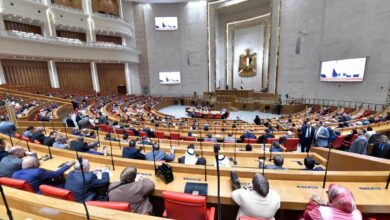
Earlier this year, the Layan publishing house announced a project to gather and publish the personal stories of Egyptian women who had been through divorce and managed to rebuild their lives, even finding a degree of happiness, whether alone or with a new partner.
The stories are to be published next year in a book titled "I'm Divorced and Happy", and the project is still very much on course.
However, the strong negative reactions experienced by some contributors to the project seem to highlight just how sensitive the issue of divorce is in Egypt — and the dangers of discussing it openly.
Meanwhile, ever mindful of the strong emotions involved, Layan has been careful to avoid any content that seems to promote divorce or that seeks to set men against women.
The project's key aim is to reduce the stigma associated with divorce, particularly for women in Egypt. By publishing a book of "success stories" from divorced women, Layan hopes to achieve a degree of adjustment in the largely negative way divorce is viewed here.
It is hoped that divorced women reading the stories will take heart from the happy outcomes, while readers in general will learn something about the various hurdles that Egyptian face when they decide to break free from an unhappy marriage.
Egypt’s divorce rates are at an all-time high, having risen from 180,000 cases in 2014 to 200,000 in 2015, making it one of the world’s most divorced nations.
In 2000, with the passing of the “Khula’a” (removal) law, women were finally allowed to divorce without their husband's permission. However, divorce is still seen by many as the end of the line for Egyptian women, both in terms of personal life and social status.
It was partly in order to correct this impression that Fathy al-Mazeen, the founder of Layan, decided to publish the book. He was alarmed by the increase in divorce rates over the years, and felt that women needed a new, more positive, perspective on the situation — ideally based on real-life stories of survival and renewal.
“I recently read that Egypt is among the countries in the world with the highest number of divorces per year," says Mazeen, "and I felt that if there were so many divorcees walking around, there needs to be a change in this outlook that demonizes them so much.”
Mazeen explains that divorced women in Egypt are often seen as having a bad reputation, because without a husband, a woman is considered more prone to promiscuous activity.
“So what if she’s unmarried?” says Mazeen, angry at the thought that a woman is judged by the presence or absence of a husband in her life.
Walking a fine line
The problem for Layan is that in putting the book together it's been necessary to avoid causing unnecessary offense, which means walking a fine line between being too bold and diluting the original message. For this reason, the stories in the book do not attack the male point of view, and any material that presents either sex in a negative light has been excluded.
“We don’t want to describe divorce as an achievement," says Mazeen. "What we’re trying to say is that divorce does not make you a good person or a bad person — it is just something that happens to people.
"What we want these stories to show are women who are happy working or happy studying, or even doing nothing at all," he continues. "But ultimately what these stories will show are women who are over their divorce and are living their lives."
Despite the care that has been taken in writing and editing the stories, there has inevitably been some negative feedback in the first few months of the project after two writers provided glimpses of their stories online.
University professor Dr Iman al-Amir and writer Alaa Ezz al-Din made their involvement in the project public via social media, showing excerpts of their contributions.
Among the comments were some negative reactions from individuals who felt offended by the very idea of women apparently celebrating gaining freedom from their husbands. According to Mazeen, the two women also received calls from conservative media officials who hounded them for comments day after day.
Since this negative experience, both authors have been hesitant about sharing more of their work prior to publication next year, preferring to avoid media interviews on the topic.
“We live in a conservative country," says Mazeen. "These two women’s families are on Facebook and will have seen their pictures going around, with people commenting on them and so on. This project deals with sensitive subject matter and what happened to these two women is the biggest proof that our initiative has come at an opportune time."




